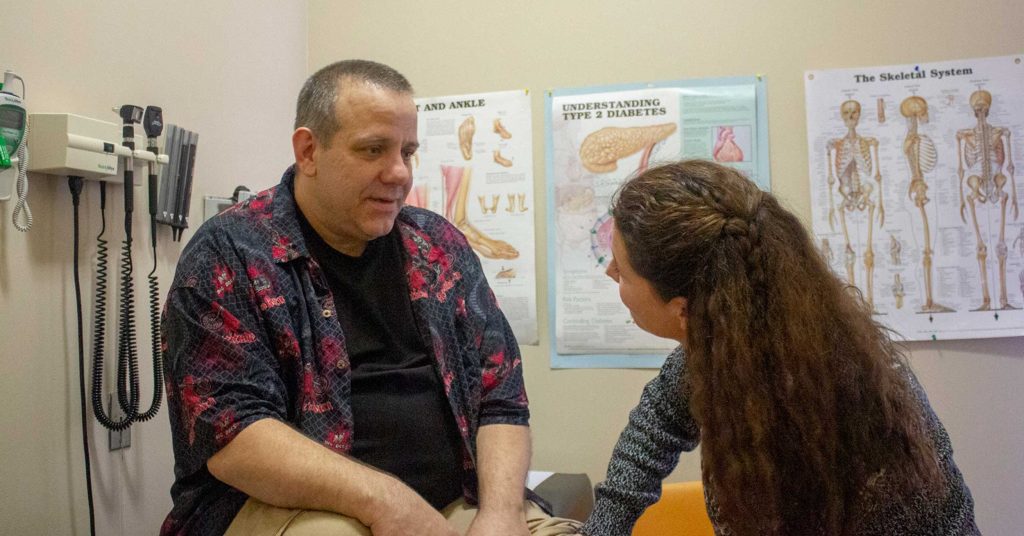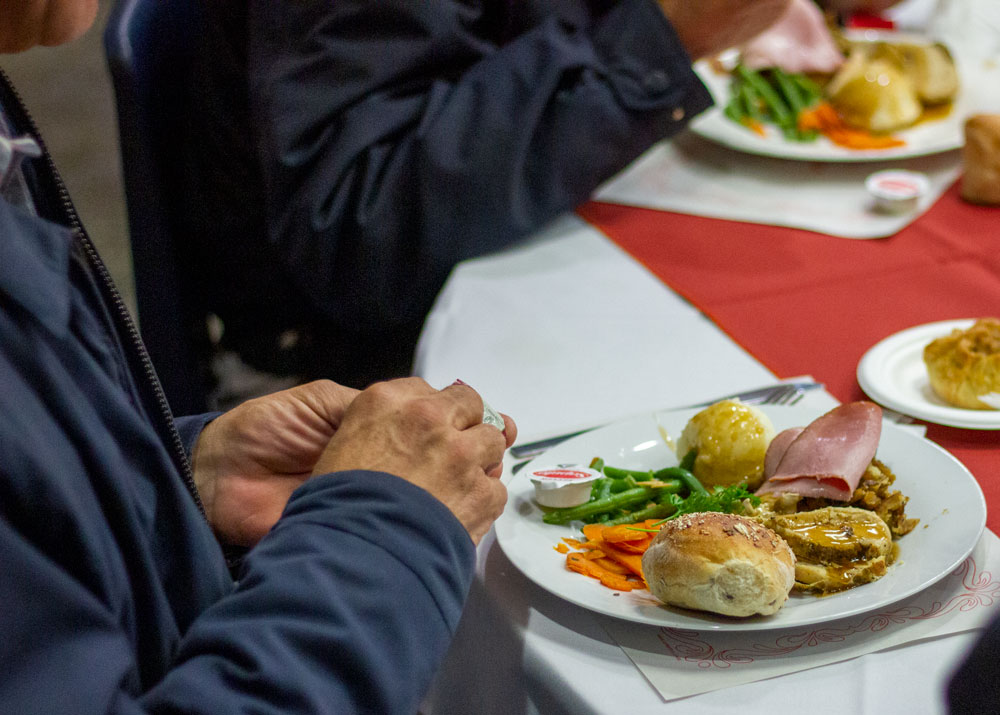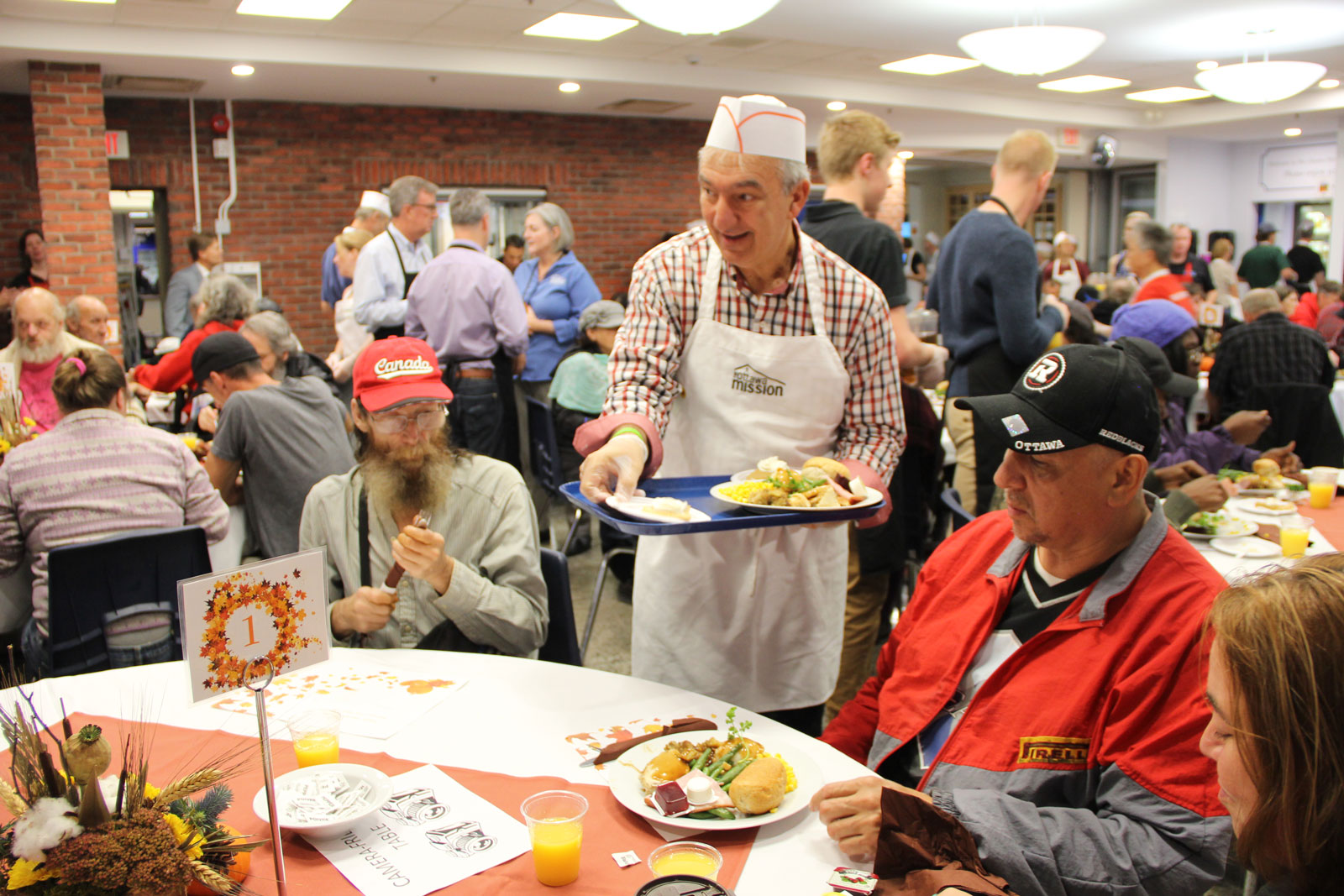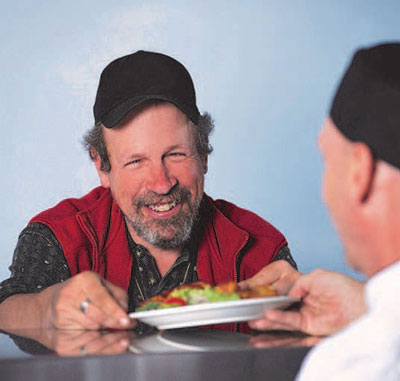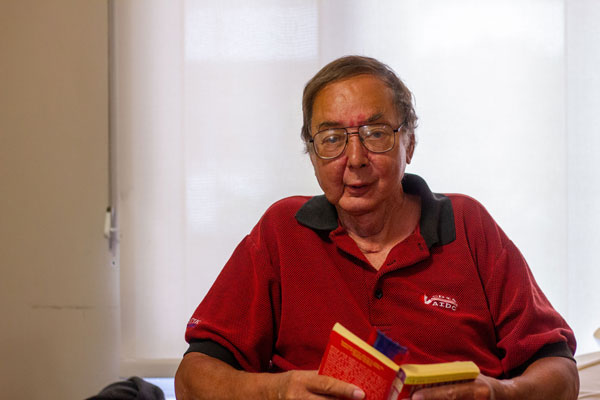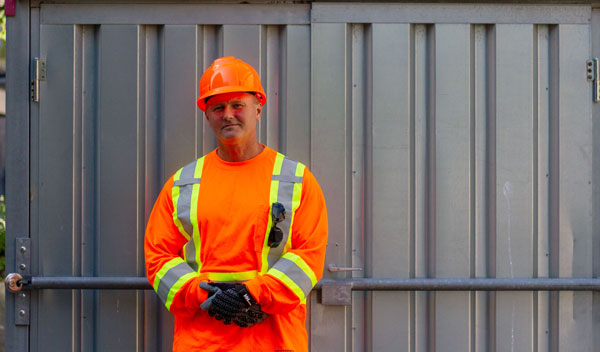This questionnaire was sent to candidates in ridings in and surrounding Ottawa who had valid email addresses. The chart below summarizes the responses of all candidates that were sent in to The Ottawa Mission. The chart does not advocate voting for any party or candidate.
Q1 – Will you/your party invest in building new affordable housing across the country in which tenants pay no more than 30% of their income? How much money will you invest? How will you go about creating more housing?
Q2 – Will you/your party invest in housing loss prevention measures such as rent supplements, housing allowances and other measures to help stem the flow of people into homelessness?
Q3 – To address homelessness, you have to address not only the need for homes, but also the social determinants of homelessness such as poverty, mental illness, and other factors. How will your party work with municipalities to support urgently needed funds for affordable housing, and also address the underlying causes of homelessness.
Jennifer Purdy – Green Party of Canada – KANATA CARLETON
A1 – I have been an ardent supporter of the Mission (and Sheps) for several years now. Our plan is as follows:
- Legislate housing as a legally protected fundamental human right for all Canadians and permanent residents.
- Appoint a Minister of Housing to strengthen the National Housing Strategy so that it meets the needs for affordable housing that are unique to each province, and oversee its implementation in collaboration with provincial ministers. This recognizes that housing is provincial jurisdiction. The target would be 25,000 new and 15,000 rehabilitated units annually for the next 10 years.
- Increase the National Housing Co-investment Fund by $750 million for new builds, and the Canada Housing Benefit by $750 million for rent assistance for 125,000 households.
- Create a Canada Co-op Housing Strategy that would update the mechanisms for financing co-op housing, in partnership with CMHC, co-op societies, credit unions and other lenders.
A2 –
- Include new and existing housing as eligible infrastructure for funding purposes, allowing the Canada Infrastructure Bank to support provincial and municipal housing projects.
- Provide financing to non-profit housing organizations and cooperatives to build and restore quality, energy efficient housing for seniors, people with special needs and low-income families.
- Restore tax incentives for building purpose-built rental housing and provide tax credits for gifts of lands, or of land and buildings, to community land trusts to provide affordable housing.
- Restore tax incentives for building purpose-built rental housing and provide tax credits for gifts of lands, or of land and buildings, to community land trusts to provide affordable housing.
- Remove the “deemed” GST whenever a developer with empty condo units places them on the market as rentals. Re-focus the core mandate of Canada Mortgage and Housing Corporate (CMHC) on supporting the development of affordable, non-market and cooperative housing.
- Change the legislation that prevents Indigenous organizations from accessing financing through CMHC to invest in self-determined housing needs.
A3
- Expand the single-payer Medicare model to include Pharmacare for everyone as well as free dental care for low-income Canadians.
- Negotiate the Canada Health Accord to prioritize expansion of mental health and rehabilitation services, reduction in wait times, access to safe abortion services and access to gender-affirming health services such as hormones, blockers, and surgery.
- Uphold Jordan’s Principle in full, ensuring Indigenous People receive the health care they need without being delayed by bureaucratic disagreements over jurisdiction.
- Reorient Health Canada’s mandate towards mental health and addictions, health promotion and disease prevention, and the health risks of climate change.
- Establish a national mental health strategy and a suicide prevention strategy to address the growing anxieties plaguing Canadians regarding inequality and affordability, the growing precariousness of work and housing, the climate crisis, social isolation, resurgent racial and ethno-nationalism and other harms and risks.
- Establish a universal Guaranteed Livable Income (GLI) program to replace the current array of income supports, such as disability payments, social assistance and income supplements for seniors.
Gordon Kubanek – Green Party of Canada – CARLETON
A1 – We will help with affordable housing by intensifying all cities and stopping urban sprawl and working with the provinces to mandate that affordable housing is a part of all development.
A2 – we know that without a home people become sick both physically and mentally and cannot heal from any addictions, etc. they may be struggling, so eliminating homeless is ESSENTIAL – in both a moral and financial manner
A3 – We will give cities the power to tax by transferring some of the GST and fed. Gas tax to the cities and mandate that is it used for programs such as this.
Vincent Cama – Communist Party of Canada – WEST NEPEAN
A1 – The Communist Party’s housing platform is specifically designed to ensure that all of us – no matter how much or how little we make – is guaranteed the right to decent housing. In Vienna, Austria, 62% of the housing stock is social housing. It is actually the preferred place to get housing there because, unlike here, it is well designed and well kept. It is a holistic system where people can expect to live full and meaningful lives and that’s what we want to create here. These would be 100% publicly owned and operated without the “assistance” of the private sector. In brief, our platform calls for:
- Building one million units of social housing for sale and for rent across the country, simultaneously creating hundreds of thousands of new green jobs in construction and manufacturing.
- Enacting a federal housing policy that recognizes housing is a fundamental human right, and making housing a public utility.
- Ensuring that no-one pays more than 20% of their income on shelter using rent controls and rent roll-backs.
- Using federal powers to end the housing crisis and homelessness now.
- Building emergency shelters and transition housing.
- Banning evictions, mortgage foreclosures and utility cutoffs due to unemployment.
- Establishing federal-provincial-municipal land banks to assemble land for affordable social housing, schools, hospitals, parks and public works, and to prevent developers and builders from gobbling up valuable public land to inflate housing prices and rents, for profit.
- Guaranteeing tenants the right to organize.
We would invest whatever necessary to make sure that these things happen and we would pay for it by re-introducing a real progressive taxation system that would see the rich pay substantially more into federal revenues than they do at present, placing the banks and industrial manufacturing and engineering firms under public and transparent democratic control [ie. nationalizing] and slashing military spending by 75%.
A2 – The Communist Party is of the opinion that rent supplements, housing allowances and other such measures do not go far enough in addressing the scope and scale of the housing crisis. Instead of these options that often end up as simple subsidies for landlords in the final analysis, we would, as above, pursue a housing strategy that would in time guarantee everyone quality housing as a fundamental right.
A3 – The Communist Party could not agree more with this analysis and we would combine the aforementioned housing strategy with a comprehensive full-employment strategy to address the underlying social causes of homelessness in Canada that would raise wages, pensions and living standards across the board. This would involve massive state investments in infrastructure with value-added jobs in environmentally sustainable manufacturing. We’d be basically rebuilding Canada’s infrastructure in many cases from the bottom up to address and reflect the environmental reality of our present era of man-made climate change and to meet the needs of the entire population, ensuring that people and nature are put before profit with every decision. Not a small job that and one that requires many hands. This includes the aforementioned plan for new social housing plus revamped mass transit, electrical and renewable energy systems at the municipal, national and federal levels. Our platform also speaks to providing 100% free and universal healthcare, visioncare, pharmacare, mental health care and other social programs.
If these ideas seem too bold and unrealistic I would remind you of the incredible wealth gap in this country and in most of the western world, illicitly made off the backs of working people the world over and which serves no purpose but to flatter the personal vanity of a fundamentally useless element of society: the bourgeoisie, the rich, the 1%, whatever you want to call them, we don’t need them. We believe that wealth does not exist in bank accounts but in the human and natural resources of all nations on earth. It’s our duty as socialists to put forward an alternative vision of what society could be, always taking the perspective of serving the poor and oppressed, and that’s what we’ve done. The problem at present is not a fundamental scarcity but in the priorities that we set as a society. A realistic and sustainable system would unbind human and natural resources from the inhuman reach of the so-called “free market” and re-prioritize human life and the natural environment above profit. This involves smashing the present status quo that continues to labour under the fantasy that the wealthy are good-faith stakeholders in society. A simple look at reality will tell you: they are not and the majority of people would be better off if they didn’t exist. Let’s get to it.
Zaff Ansari – New Democratic Party of Canada – NEPEAN
A1 – Yes, not only will we maintain current investment, we will significantly increase it. Our federal investment will begin with $5 billion in additional funding in the first year and a half of a New Democrat government.
A major part of the long-term solution to the problem is to ensure that more affordable rental units are built across the country. That’s why a New Democrat government will create 500,000 units of quality, affordable housing in the next ten years, with half of that done within five years. This will be achieved with the right mix of effective measures that work in partnership with provinces and municipalities, build capacity for social, community, and affordable housing providers and co-ops, and meet environmental, energy-efficiency goals.
A2 – The NDP platform commits rental benefits of up to $5,000 each year. As Jagmeet Singh has noted, “we need to have the courage to act. That’s why New Democrats will deliver immediate help for families who are struggling most to pay their rent.” The NDP’s rental benefit will be targeted at families who are paying more than 30 per cent of their pre-tax income on housing, as immediate help to make ends meet.
A3 – We believe we need the courage – and meaningful action – to build a Canada without poverty, where all Canadians can count on quality public services and community supports to help them lead dignified lives. A core component of our approach is enshrining in law the right to housing and starting work now with a goal of ending homelessness in Canada within a decade.
Our affordable housing strategy will include measures to support Canadians at risk of becoming homeless, take the lead from communities about local needs, and adopt a “housing first” approach. To help people find an affordable home in the long term, we will support the creation of more social housing and other affordable options. Poor health and poverty are linked and a national pharmacare program will mean that all Canadians can access the prescription medicine they need, regardless of their income, or address. Better access to mental health and addictions support will also form a key part of our approach to tackling poverty, and homelessness. A New Democrat government will work with the provinces to launch a national basic income pilot project in addition to continuing Ontario’s program, in order to gather data about this approach to tackling income precarity.
Angella MacEwan – New Democratic Party of Canada – OTTAWA SOUTH
A1 – The NDP will build 500,000 units of quality, affordable housing in the next ten years, beginning with an investment of $5 billion in additional funding for affordable housing in the first year and a half of a New Democrat government. This will be achieved in partnership with provinces and municipalities, and will aim to build capacity for social, community, and affordable housing providers and co-ops, and meet environmental, energy-efficiency goals. In order to kick-start the construction of co-ops, social and non-profit housing, we will set up dedicated fast-start funds to streamline the application process and help communities get the expertise and assistance they need to get projects off the ground today, not years from now.
A New Democrat government will also spur the construction of affordable homes by waiving the federal portion of the GST/HST on the construction of new affordable rental units – a simple change that will help get new units built faster and keep them affordable for the long term. These measures will help address the housing crisis at the source, but we also need to make sure that families who are hurting get help now. Families do not have years to wait when every day is a struggle and a constant worry. That’s why we’ll provide immediate relief for families who struggle to afford rent in otherwise suitable housing, while we bring forward long-term solutions to the housing affordability crisis.
A2 – An NDP government will provide direct and immediate help to families who are in core housing need, paying more than 30% of their income on rent. A rent subsidy of up to $5000 per family per year will be available.
A3 – New Democrats believe the time has come to build a Canada without poverty, where all Canadians can count on quality public services and community supports to help them lead dignified lives. A core component of our approach is enshrining in law the right to housing and starting work now with a goal of ending homelessness in Canada within a decade. Our affordable housing strategy will include measures to support Canadians at risk of becoming homeless, taking the lead from communities to address local needs, and adopting a “housing first” approach. To help people find an affordable home in the long term, we will support the creation of more social housing and other affordable options.
Poor health and poverty are linked and a national pharmacare program will mean that all Canadians can access the prescription medicine they need, regardless of their income, or address. Better access to mental health and addictions support will also form a key part of our approach to tackling poverty, and homelessness. A New Democrat government will also work with the provinces to launch a national basic income pilot project, in addition to continuing Ontario’s program.
Morgan Gay – New Democratic Party of Canada – OTTAWA SOUTH
A1 – One of my key fights is for a national affordable housing policy that has teeth. Last year, the Herongate community experienced a mass eviction that forced more than 500 people from their homes. The renters who were forced to leave had few options for where to go. They’re not alone. A recent study found that a minimum wage worker could afford an average-priced apartment in none of Ottawa’s 27 neighbourhoods. Rising rental costs are making life unaffordable for many including people living on fixed incomes; single earner households; and the one in four Canadians who earn within $3 of their province’s minimum wage. Electing an NDP government will ensure that 500,000 quality, affordable housing units are built in the next ten years with a federal investment starting at $5 billion in additional funding in the 1.5 years to jump start the development, and 250,000 of these units become available in the first five years.
A2 – The measures listed above will help address the housing crisis at the source, but we also need to make sure that families that are hurting get help now. That’s why the NDP will provide relief for families that are struggling to afford rent in otherwise suitable housing, while we bring forward long-term solutions to the housing affordability crisis. The NDP has pledged to offer annual subsides of up to $5,000 families as a way to deliver immediate help for families struggling to pay their rents. This would benefit nearly 500,000 families.
A3 – The NDP affordable housing strategy will include measures to support Canadians at risk of becoming homeless, take the lead from communities about local needs, and adopt a “housing first” approach. In a country as wealthy as Canada, there is no excuse to leave any Canadian living in poverty without a safe roof over their head. Poor health and poverty are linked and the NDP pharmacare program will mean that all Canadians can access the prescription medicine they need, regardless of their income, or address. Better access to mental health and addictions support will also form a key part of our approach to tackling poverty. New Democrats will also work with the provinces to launch a national basic income pilot project in addition to continuing Ontario’s program, in order to gather data about this approach to tackling income precarity.
Larry Wasslen – Communist Party of Canada – OTTAWA SOUTH
A1 – The Communist Party fully recognizes the depth of the housing crisis across Canada. From large cities to rural communities to First Nations territories there is a very large housing deficit. Housing is a Human Right. Consequently we argue that a comprehensive solution is required. The two foundational pillars of our program including publicly owned and democratically controlled housing. We call for the federal govt to become directly involved in creating 250,000 units each year for the next four years. In addition we call for extensive investment in improving already existing social housing. We need to remove profiteering from the housing equation.
A2 – Loss prevention is another critical issue. Many families are one payday away from loosing their shelter. Our program calls for a number of measures to prevent this. A serious effort to establish rent controls that blocks landlords from increasing rents is very important. We are the only party calling for rent roll backs. Our comprehensive program calls for a shift of wealth from corporations and the wealthy to the working class and poor. Examples include $20.00 minimum wage and a guaranteed liveable annual income among many others. Profiteering is the route cause and we are the only party willing to face this challenge head on.
A3 – Our party posits that municipalities should have a constitutionally recognized role in our country. This would certainly enhance their ability to address serious issues. Over the past 60 years at least the Communist Party has called for a massive expansion in comprehensive Medicare to include mental health, pharmacare, dental care, vision care. Interestingly, in this election both the Greens and the NDP are moving towards our comprehensive approach on some issues. Yet I must emphasize that our approach does not mean downloading the costs of these services onto municipalities as liberal, conservative, and social democratic parties have done over and over again. The Federal Govt must take the lead in all these areas. Funds to deliver these programs should be raised by significantly increasing taxes on corporations and the wealth and by a drastic cut in war spending.
Merrylee Sevilla – People’s Party of Canada – OTTAWA CENTRE
A1– One of the first things I would do as the People’s Party Candidate for Ottawa-Centre is work with local government to see what is and has been the delay with regards to affordable housing. I would look to find investors who would be willing to work with Federal, Provincial and Municipal levels of government to fix, improve and renovate buildings that have remained untouched and abandoned. Doing this would allow for us to provide temporary housing while a proper course of action, projects are taking place. I would like to work with all levels of government to address the inaction of parties involved with LeBreton Flats and work to break ground on ACTUAL affordable housing. Housing should not have to cost low-income families most if not all they have.
The money we are looking to invest comes from cutting corporate welfare, which presently represents nearly $5 billion in savings. This can go towards housing and healthcare. Housing, specifically, affordable housing for families and veterans is very important to me. I have had the opportunity to meet with people of all backgrounds living on the streets, moving from temporary housing to housing, and this is no way to treat Canadians, let alone keep the government promise of helping the most vulnerable. Addressing the affordability housing and creating more homes and a plan to address this means that we are one step closer to helping them become helpful in society. Without a roof over one’s head, how can they feel safe, secure or even think about anything else – affordable housing is a priority for me and I know we, I can make it happen within four years. Sometimes, we need to think outside the box, and our present government is not thinking outside the box, let alone keeping their promise to help the very people they claim to help.
A2 – To ensure families and veterans do not fall into homelessness, we would create a program/system that ensures proper funding and support. This does not have to result in increasing taxes to already struggling and hardworking Canadians, this can come from cuts to Corporate Welfare and foreign aid – both would result in nearly $10 billion in Canadian savings and revenue. This would assist provinces far and wide and allow provinces the proper funding to get ahead but also feel secure. Provinces would have the ability to ensure that families, veterans and refugees are taken care of and kept off the street. This can be done through shared housing units for single people, to co-op housing for families. I walk through the streets of Bank, Somerset and more and I see buildings vacant, lots unoccupied. Imagine investing in cots, in beds to give people a place to feel safe or comfortable.
A3 – Homelessness is sometimes a result of bad luck from job-loss, mental health and other factors that are sometimes beyond our reach. To ensure that we can mitigate if not prevent homelessness, we would work with the provinces and municipalities to see what other countries have done to help those with mental health, social and health service programs. Creating and investing in city services, such as outreach programs will allow for those experiencing homelessness to see personal and one-on-one assistance.
For those suffering from mental health issues, we would ensure that provinces are held accountable and are creating the necessary services within their health services. That they are taking the innovative route and promoting the programs and services to help those suffering from mental health. When it comes to addressing poverty, we would simplify a tax system that has been designed to punish hardworking Canadians. There would be two tax brackets. This would allow for Canadians to save more. There are ample job opportunities, and sometimes something as simple as not having the proper work boots can be a barrier – we would work with provinces and cities to help individuals wanting and seeking work be able to have access to the necessary equipment and training.
Catherine McKenna – Liberal Party of Canada – OTTAWA CENTRE
A1 – Homelessness has an impact on every community in Canada. It affects individuals, families, women fleeing violence, youth, seniors, veterans and people with disabilities. In 2016, an estimated 129,000 people experienced homelessness at an emergency shelter. This is why we have committed $2.2 billion to tackle homelessness across the country. Every Canadian deserves a safe and affordable place to call home. Yet, every day, vulnerable Canadians experience homelessness, or are at risk of becoming homeless. The Government of Canada is taking action to help those in need and make a real impact to reduce homelessness across Canada.
Our government launched the National Housing Strategy which is the largest and most ambitious federal housing program in Canadian history. Over the next decade, it will invest $55+ billion to build stronger communities and help Canadians across the country access a safe, affordable home. The goal of this historic strategy is to make sure Canadians across the country can access housing that meets their needs and that they can afford. Over the next 10 years, the Strategy will:
- Cut chronic homelessness in half;
- Remove 530,000 families from housing need; and
- Invest in the construction of up to 125,000 new affordable homes
I am calling for a 10-year plan to address the need for more affordable housing in Ottawa Centre. I will work with all levels of government and stakeholders in the non-profit housing and private sectors to develop a plan with clear targets and timelines. Further, I am committed to ensuring:
- The full spectrum of affordable housing will be part of the development at Lebreton Flats;
- The reduction of red tape required for the acquisition of surplus federal lands for new affordable housing projects; and
- A focus on building more affordable rental housing which experts view as key to addressing low vacancy rates and high rent.
Homelessness is a pervasive issue, which is why we launched Reaching Home: Canada’s Homelessness Strategy. Through Reaching Home, the Government of Canada is reinforcing its existing community-based approach by delivering funding directly to municipalities and local service providers. We will also expand the program’s reach to up to six new communities through an open and transparent process which is currently underway. Homelessness is not experienced the same way for all Canadians. This is why we created specific programs to address Indigenous homelessness and homelessness in rural and remote areas.
A2 – Every Canadian deserves a real and fair chance to succeed. Having a fair chance also means having a fair opportunity to housing. This is why our government created the Canada Housing Benefit. Launching in 2020, the CHB will provide an average of $2,500 towards rent to Canadians in housing need. Designed to meet local needs and delivered by provinces and territories, the CHB will be a new tool to fight the challenge of housing affordability. As part of the National Housing Strategy, the CHB is expected to help 300,000 families for whom housing affordability is a challenge.
To help more people buy their first home, we will move forward with the new First-Time Home Buyer Incentive, which gives people up to 10 per cent off the purchase price of their first home. We will also increase the qualifying value to nearly $800,000 in the places where houses cost more – like the greater Toronto, Vancouver, and Victoria regions. As market dynamics change in different regions, the program will be adjusted to reflect those realities. To limit the housing speculation that can drive up home prices, we will also put in place a consistent national tax on vacant residential properties owned by non-Canadians who don’t live in Canada. And we will work with interested provinces, territories and communities to establish a national approach to beneficial ownership so that law enforcement and tax authorities have the tools necessary to crack down on financial crime in the real estate sector, while respecting Canadian privacy rights. Initiatives like these support our government’s overall commitment to improve the well-being of all Canadians and strengthen the middle-class.
A3 – As Canada’s demographics change and new health care challenges emerge, federal, provincial and territorial governments must work together to innovate, adapt and improve health services to better meet the needs of Canadians and address the problem of homelessness. In Budget 2017, our government committed $11 billion over 10 years to provincial and territorial governments to support home care and mental health. This funding will help more Canadians to receive better care at home or in their community—including enhancing access to palliative care and end-of-life care, increasing support for caregivers and enhancing home care infrastructure, such as digital connectivity and facilities for community-based service delivery. It will also help expand access to community-based mental health and addiction services, particularly for children and youth. We will continue to collaborate with the provinces and territories to move forward with more accessible care, shorter wait times, and better health outcomes, and we will:
- Make sure that every Canadian has access to a family doctor or primary health care team, improving the quality of care for the nearly five million Canadians who today lack access.
- Set clear national standards for access to mental health services so Canadians can get the support they need quickly, when they need it most.
Our poverty reduction strategy, Opportunity for All, has produced great results, with the poverty rate in Canada falling 20% to 9.5% from 2015 to 2017. Through this strategy, we are committed to reducing poverty by 50% by 2030. The Canada Child Benefit is an important part of the poverty reduction strategy. We are committed to building on the success of Canada Child Benefit (CCB) – which gives more money every month to nine out of 10 families and helped lift 300,000 children out of poverty. We will move forward with the next steps in helping families make ends meet. We will:
- Give up to $1,000 more to families to help when the costs of raising kids are highest, by boosting the CCB by 15 per cent for children under the age of one;
- Make sure families get more money right away, by making maternity and parental benefits tax- free; and
- Make paid leave fairer for families, by introducing a 15-week leave for adoptive parents – including LGBTQ2 families – so they get the same benefits to help care for their kids as everyone else.
We also increased the Guaranteed Income Supplement top-up by up to $947 a year for the most vulnerable single seniors, which has improved the lives of 900,000 seniors. We are committing to helping seniors as they age by increasing Old Age Security by 10% at age 75. Over the last four years, our government has raised over 900,000 people out of poverty. But we know there is more work to be done to ensure that we hit our target of reducing poverty in Canada by 50% from 2015 levels by 2030 – this is an effort that will have real impact on the lives of the most vulnerable Canadians.
Kevin Hua – New Democratic Party of Canada – Carleton
A1 -Yes, the NDP has committed to investing in the construction of 500,000 units of affordable housing and we further intend to waive the federal GST on affordable housing construction to better invigorate the construction of such units. We’ll also combat money laundering and speculation which buy up housing stock whilst leaving the homes empty and unused. And finally, implement regulations on AirBnB, who have been notorious in moving vital housing from the long-term rental market to the short-term rental market, driving up the price of long-term rental housing.
A2 – Yes, we have committed to re-introducing 30-year terms to CMHC insured mortgages on entry-level homes so Canadians can pay in smaller monthly payments and doubling the Home Buyer’s Tax Credit to $1500. We recognize that housing is a human right that no Canadian should be exempted from it.
A3 – To address homelessness, you have to address not only the need for homes, but also the social determinants of homelessness such as poverty, mental illness, and other factors. How will your party work with municipalities to support urgently needed funds for affordable housing, and also address the underlying causes of homelessness.
While we must bring short-term solutions to address the current housing crisis, we must as well plan long-term solutions and attack the root of the problem to ensure we do not lose the progress made. The NDP has committed to further investments into mental health to secure greater access to Canadians and to fight the stigma surrounding it. We have also committed to the principles of harm reduction in fighting substance addiction, particularly the opioid crisis in which Big Pharma needs to be held responsible by their abuses. I’ve also committed to ensuring income security whether that be through an increase in the minimum wage, pension security from corporations, or cutting the cost of living. As for working with municipalities, one of the problem is they struggle to secure revenue to fund the many needs of their municipalities, so we’ve already committed to double the gas tax transfer to municipalities to help them fund many projects including affordable housing and combatting the roots of homelessness.
